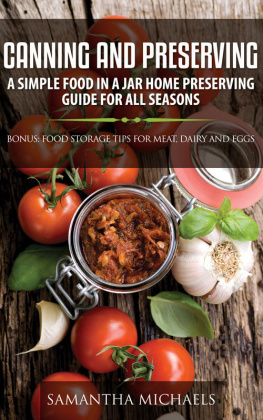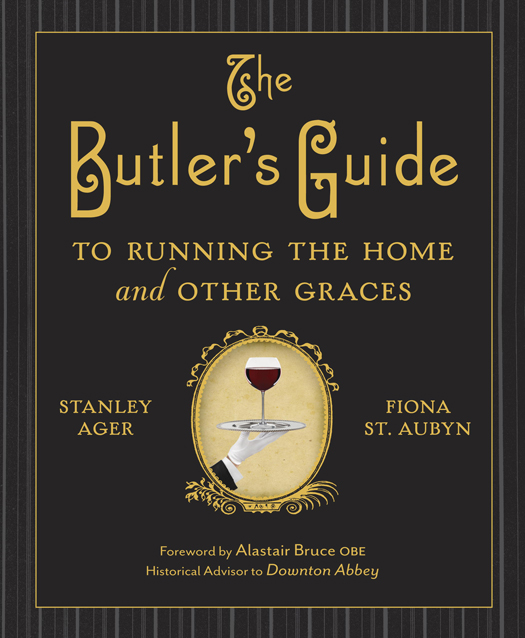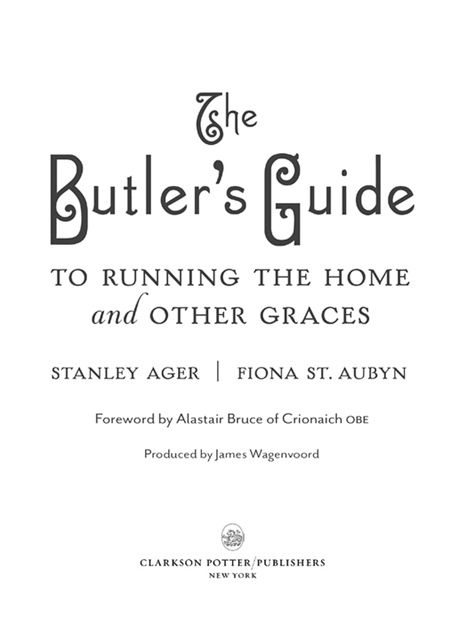Copyright 1980 by James Wagenvoord
All rights reserved.
Published in the United States by Clarkson Potter/Publishers, an imprint of the Crown Publishing Group, a division of Random House, Inc., New York.
www.crownpublishing.com
www.clarksonpotter.com
CLARKSON POTTER is a trademark and POTTER with colophon is a registered trademark of Random House, Inc.
Originally published in hardcover in the United States by Bobbs-Merrill Co., Inc., in 1980.
Library of Congress Cataloging-in-Publication Data
Ager, Stanley.
The butlers guide to running the home and other graces.
Previously published as: Agers way to easy elegance, 1980.
1. Home economicsHandbooks, manuals, etc.
I. St. Aubyn, Fiona, joint author.II. Title.
III. Title: The butlers guide to running the home and other graces.
TX159.A35 640 81-5679
eISBN: 978-0-385-34471-5
Book design by Stephanie Huntwork
Cover design by Stephanie Huntwork and Rae Ann Spitzenberger
Cover photography Lew Robertson
v3.1
IN MEMORY OF BARBARA, MARY AND PIERS
CONTENTS


FOREWORD
IT WOULD HAVE been wonderful to meet Stanley Ager and to hear his stories firsthand. His witness would have been particularly illuminating to someone sharing my interest in the period when many dedicated their lives in Service to others. In Stanley Agers case, it was what he really wanted to do. You can read in these pages about the skills acquired during his career, which was a sort of calling dedicated, in his own words, to the three most important qualities for running a home (which) are punctuality, organization, cleanliness. If you master these, everything else should fall into place.
Helping to make the TV series Downton Abbey, as the historical advisor, I have found memories and insights left by men and women that lived and served in such extraordinary households to be tremendously informative. These voices from years past carry an empiric guide to a unique way of living, where everyone depended on one another while carrying out their own distinct role and function. Status and duties gave clarity of purpose and position, but no one, no matter how high or low their degree, was free from the strict expectation of standards. Perhaps, for this reason alone, the lengthy era of service and great houses was destined to end.
Many may say hoorah for the end of all that. Yet, in the post-deferential, post-modern and post-caring-much-about-much world, which has evolved over the years, where equality sometimes provides less happiness and fulfillment than was hoped, we still have a fascination for, and seek out, the illusive excellence of living; a style that was emblematic of the period. Writing with co-author Fiona St. Aubyn, the granddaughter of his last employer, the third Lord St. Levan, Stanley Ager became one of the few in his profession to actually record what he knew and how he lived. By doing this he ensured that a particular lifestyle was captured, and he writes in an accessible way that any householder can comprehend. He offers a unique opportunity to grasp at parts of a world that has all but disappeared. We owe him a deep debt of gratitude, since memories of this kind are no longer passed by word of mouth. It is as though, from the grave, he still enables the three qualities of living, quoted above, to be reached through his guidance.
Known as Ager by his employer and Mr. Ager by the household staff, he served for nearly three decades at St. Michaels Mount, a castle that magically crowns a small island off Englands Cornish coast. During his years in service he traveled the world, married, raised two wonderful daughters, and was accepted and valued greatly as a de facto member of the Mount family. He retired following a fifty-three year career, with his wife, Barbara, (a former head parlour maid herself) to a spotless, sparkling, mainland cottage overlooking Mounts Bay and St. Michaels Mount.
To Stanley Ager the gift of human service was no one-way loyalty. He clearly gave his all to the families he served but, though he was almost too polite to state this, his expectation of loyalty in return was implicit. And he would have expected the highest standards from the families he toiled for. Their conduct, standing and the behaviour towards their staff was as important to him as the crease on his masters shirts, the freshness of the flowers in the hall and the warmth of welcome all guests received at St. Michaels Mount.
In fact, this subtle message is often the ingredient most forgotten today by those seeking to re-create that same grace in entertainment. Frequently the waiter or waitress struggling among a throng of guests, carrying a tray of canaps or a fresh bottle of champagne is ignored, brushed away or even abused. Yes, it is perfectly right for a host or hostess to expect the highest standards from those paid to deliver them. But this does not make them slaves. Mr. Ager expected courtesy from the families he served and from their guests. In most cases, this gentlemanly instinct of respect for others had been instilled by iron-willed nannies. It was understood by all classes because schools and the pulpit underscored selflessness as a noble quality but, for some reason, this human strength seems to be on the wane. Equally, however, Mr. Ager did not want his employer to throw an arm round his shoulder and call him Stanthe idea of inappropriate informality would have seemed impolite and alien. Finding a balance today, which works for an evolving generation, depends on local culture and changing conventions but the enduring quality of courtesy to all should make a better world and certainly a more enjoyable partyfor all.
Of course, the period of service was no perfect Narnia. Far from it. There were always bad apples above and below stairs, and Julian Fellowes writes a fizzing reality for this in Downton Abbey. Quite what Mr. Ager might have made of the Downton story lines will never be known. But I sense he would have appreciated the efforts made by the producers to ensure that the subtle background details of behaviour, household pace and conduct are right. After all, these were the very same things that Mr. Ager dedicated his career to see crafted into perfection, for those he served.
It is this striving for perfection that is present in even the smallest details and in the precise way in which he describes everything from keeping moths out of clothes, folding napkins and managing the preparation of luggage. The age of Tshirts, jeans and trainers makes limited call on such things but, if you fly to London from New York for a meeting, and you have folded your suit using tissue paper, as Stanley Ager describes, you can simply shake it out and go straight to the meeting, without a crease. Its a trick typical of the techniques and insights that people of his generation and profession learned and handed down from one generation to another.
















